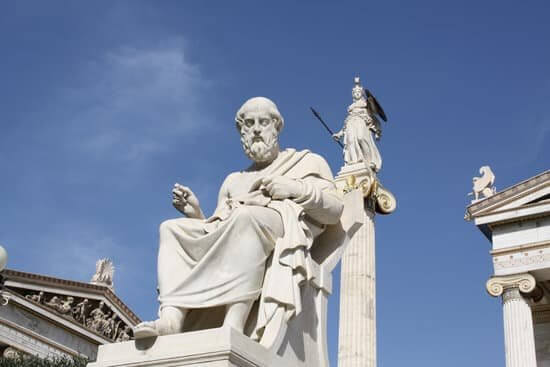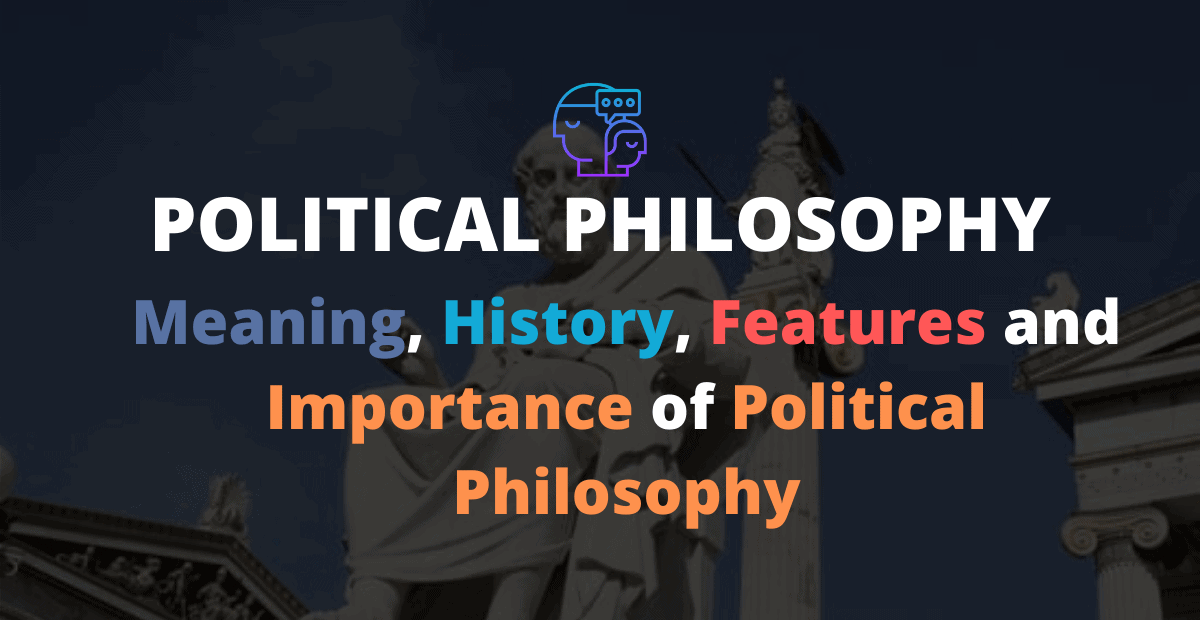Political philosophy is the philosophical thought about the state, the nature of the state, its functions, values, the truth of the state experience, and the philosophical inquiry into the validity of the state experience as the ultimate fulfillment of life, and the world.
The importance of political philosophy in our multidimensional lives is immense.
In this article, I have answered some questions related to political philosophy. These are-
- What is Philosophy?
- What is Political Philosophy?
- What are the features of Political philosophy?
- What is the history of Political Philosophy? and finally
- What is the importance of Political Philosophy?
In order to better understand the meaning of political philosophy, it is essential that you first know some basic things about philosophy. So let’s start with the word philosophy.
Table of Contents
What is philosophy?
The word philosophy is derived from two Greek words. These two Greek words are ‘Phile’ and ‘Sophia’. Thus philosophy stands for ‘The Love of Wisdom’. And philosophers are the lover of wisdom.

Philosophy in the broadest sense is a wide range of knowledge and perspectives. It is a kind of worldview on the basic elements of the world, life, human society, consciousness, and the process of knowledge.
Simply put, philosophy is the study of common and fundamental questions about existence, knowledge, values, reason, mind, and language. Philosophy is again an integrated form of search method. The main purpose of philosophy is to determine the relation of consciousness with reality or spirituality with the material.
Only at one stage in the development of human social consciousness has it been possible for men to think about the world and life with an analytical vision.
Man has not been able to show such power of thought from the moment of his own origin.

At a stage in the development of human consciousness man begins to think about his environment. In order to better protect their lives, people try to gain knowledge about the mysteries of the natural world. He also began to think about nature, the world, and later men’s own bodies and consciousness.
Types of Philosophy
Philosophy can usually be divided into two parts. These two parts of philosophy are –
- Idealistic Philosophy
- Materialist Philosophy
1. Idealistic philosophy
According to idealistic philosophy, the material world is a reflection of the idealistic world.
According to the idealistic philosophy, consciousness is the main thing. Here the ‘idea’ is given precedence and it is said that the material world is a special reflection of consciousness and ideas.
Among the idealistic thinkers, the Greek philosopher Plato, Aristotle, and the German philosopher Kant, Hegel, and the British philosopher T.H Green, and Bradley are the most key philosopher in political science.
2. Materialist Philosophy
According to materialist philosophers, the world of thought is known by the material world.
In materialist philosophy, the matter is considered as the source of consciousness and ideas, and the supremacy of the matter is imposed. We get the highest development of materialist philosophy through Marxism.
What is the Meaning of Political Philosophy?
Political philosophy is an important part of philosophy. It is a combination of theoretical knowledge of political life.

The purpose of political philosophy is to speak of political life as theoretical knowledge based on values.
Political philosophy means the doctrine of the state, the nature, scope, and functions of the state, and the development and progress of the human race. Political philosophy is the philosophical thinking about the state as a whole.
It asks questions about our political affairs. Which are political affairs and which are not? To find out the answer to these questions.
You can read another article about a political theory where I have discussed the term ‘Political’ descriptively.
Must-Read– Political Theory And Why Should We Study Political Theory?
So back to the point. Political philosophy teaches us to question our political life Such as-
- What political role we are playing?
- What is justice?
- What is the government?
- what is the actual meaning of liberty, rights, equality, etc?
Political philosophy does not just teach us to question politics. It enriches us with its wealth of knowledge and also helps us to find answers to those questions.
By answering the questions, we can understand which is perfect or not? so by political philosophy, we can prescribe what ought to be to make society from imperfect to perfect.
Plato, Aristotle, Hobbes, and Locke all pointed out the way to build a well-ordered political society through their philosophical knowledge.
So it can be said that the content of political philosophy is mainly significant in three cases. These are-
- Human nature and its activity,
- Human relationships with other things on earth for the whole sense of life,
- The interrelationships of society.
History of Political Philosophy
Political Philosophy in Ancient Times
Western political philosophy began with the philosophy of ancient Greece, where political philosophy originated, from Socrates and Plato. Ancient Greece was controlled by city-states, which experimented with various forms of political organization.
Plato divided those city-states into five sections based on inherent stability and morality:
- Aristocracy,
- Timocracy,
- Oligarchy,
- Democracy, and
- Tyranny.
One of the first and most important scholarly works of political philosophy was Plato’s Republic, followed by Aristotle’s ‘Nicomachean Ethics’ and ‘Politics’.
Then, Roman political philosophy also was influenced by the Stoics and the Roman politician Cicero.
Chanakya was an ancient Indian political philosopher of the fourth century BC. His famous book ‘Arthashastra’ provides details of political philosophy, foreign affairs and war policy, state systems, and state surveillance, and economic stability for a wise ruler. In ancient India, one of the sources of law is ‘Manusmriti’.
The main philosophies especially in the sixth century BC in ancient China were Confucianism, Legalism, Taoism, etc. Again each of these philosophies had a political aspect to the thought.
Philosophers such as Confucius, Mencius, and Mozi focused on political unity and political stability as the basis of their political philosophy.
Confucianism supports a highly categorized, meritorious government based on empathy, loyalty, and interpersonal relationships.
Political Philosophy in Modern Time
Political philosophy has been the most prosperous of all in the Age of Enlightenment. The great Enlightenment scholars are Machiavelli, Hobbes, Locke, Rousseau, etc.
Machiavelli’s writings provide the contemporary political crisis in Italy and his ‘The Prince’ tells what a prince should do or not.
Hobbes’s ‘state of nature’ provides us with the source of materialistic philosophy. Locke has been considered the father of Liberalism and individualism as well.
Rousseau’s Social Contract Theory influences the French Revolution in 1789.
Karl Marx In a different way taught us to constructively criticize and question the capitalist system. Karl Marx’s doctrine of communism fueled the October Revolution in Russia (1917). After the First World War, instead of democracy, we have seen the rise of Nationalism, Fascism, and Totalitarianism in Italy and Germany.
Political philosophy in the Anglo-American academic world declined in Post World War Two; because they are skeptical of the possibility of having cognitive content in ideological views, and political science was shifting to statistical methods and behaviorism.
But political philosophy has regained its importance through the hand of John Rawls and his ‘A Theory of Justice’ in 1971.
In continental Europe, on the other hand, the post-war decades saw a huge boom in political philosophy, when Marxism dominated the field. Progressive Practical Theory is a recently studied socio-economic and political philosophy.
Subject Matter of Political Philosophy
You have come so far that the scope of political philosophy is limited to theoretical discussions of the origin, evolution, functions, nature, state organization, citizen’s relationship with the state, civil rights and duties, etc.
The discussion of political philosophy about the state and its problems is value-based and objective. So it cannot be said that the state is the core of political philosophy.
Different questions of political philosophy have prevailed in different eras. Among the questions that prevailed in ancient times, especially in Greek and Roman thought are where the concept of justice, the characteristics of the ideal state, the aims and objectives of the regime, the qualifications of the ruler, and the requirements and goals of the law, whether it is possible to establish society on the basis of equality.
In the Middle Ages, the philosophy of political philosophy was a bit different. The struggle for supremacy of spiritual and worldly power has influenced the political philosophy of this age.
The reform movement against religious superstition expanded the progress of political philosophy in the sixteenth century. The idea of sovereignty and nation-state was also propagated during this time.
Various theories of state and organization predominated in the thinking of the seventeenth and eighteenth centuries. The concepts of democracy, representation, equality, freedom, etc. became popular during this time.
Among the issues that were at the root of the political debate in the nineteenth and twentieth centuries were the functions of the state, the scope, the relations between the state and the citizens, the international relations, etc.
Must Read– What Is The Meaning Nature And Scope of Political Science?
Features of Political Philosophy
After so much discussion, it is not very difficult to find out the features of political philosophy.
- Adherents of the traditional view were guided by some preconceived notions in reviewing any aspect of political life. The main purpose of political philosophy is to establish a general value about the state and political life.
- Political philosophy follows a normative approach to the analysis of the state and political life.
- Political philosophy in particular comes to a conclusion through a deductive method.
- The contribution of political philosophy is important in terms of political values and concepts. Because political philosophy, though limited, discusses the nature of politics and human life.
- Political philosophy helps to find answers to various questions of the state and society like what is government? Why should we need government? What are the roles of citizens?
- Etc.
Importance of Political Philosophy
So what is the importance of political philosophy for us?
The importance of political philosophy is immense because it studies those big questions (I have already mentioned), especially the big question of how should I live, but Nobody can not be different from that. Everybody needs the answer to this question. Most people don’t think about it much.
Political philosophy provides us with knowledge about how we live together. It enables us to differentiate between good and bad, just and unjust.
Political philosophy is the oldest field of political science. Political philosophy has persisted over hundreds of years because of the timelessness of the questions it addresses. Certain questions transcend history because they are raised by the human condition.
The pivotal one is how should be organized collective lives looms throughout the ages.
The history of political philosophy not only generates fundamental questions but also proposes to answer them.
For example the relative importance of freedom and equality, conceptions of public and private virtue, the ethics of war and the management of conflict, and contributions of religions and traditions to the common good.
It contains defenses and critiques of arguments also. It teaches us ways to think about political matters. So you understand how important political philosophy is in our life and society as well.
These ways of thinking constitute an essential part of the heritage of mankind. If we lose forget or deliberately abandoned these models are acquiring, we will do an injustice to coming generations by robbing them of profound intellectual resources vital to the search for and maintenance of the common good.
Let me share your experience with what you have learned from “Meaning, History, Features, and Importance of Political Philosophy“.
Share this with the needful students as much as you can.
Must Read– 3 Most Important Types Of Political Theory


Concise and comprehensive. Brilliant work!!!